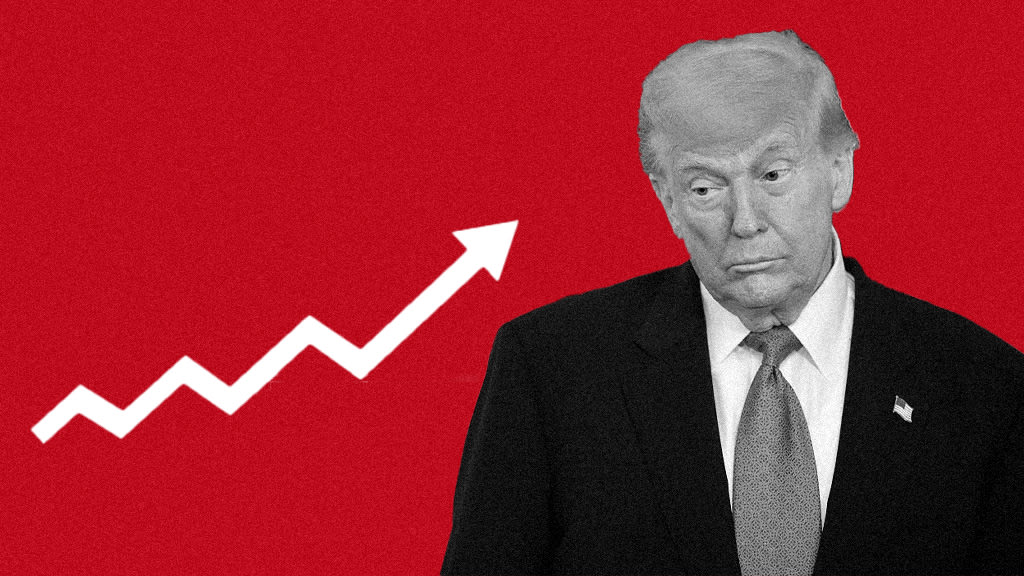Stocks tumble as hot inflation numbers douse hopes of June interest rate cut
U.S. stocks are sinking Wednesday following new inflation data that showed prices accelerated for a third consecutive month. The hotter-than-expected report further dashed hopes for Fed rate cuts this year amid fears that progress may be stalling in taming elevated price levels.
The S&P 500 slumped 1.1% in early trading and is on track for one of its worst days of the year so far. The Dow Jones Industrial Average was down 451 points, or 1.2%, as of 9:35 a.m. EST, and the Nasdaq composite was 1.1% lower.
"There are still embers of inflation here and there in the economy," said Joe Davis, chief global economist at Vanguard.
For shoppers, that's painful because of the potential for even higher prices at the store. For Wall Street, that's painful because it could convince the Federal Reserve to hold back on delivering the cuts to interest rates that traders are craving and have been betting on.
The S&P 500 had already leaped more than 20% since Halloween in part on expectations that the Federal Reserve would lower its benchmark interest rate, which is sitting at its highest level in more than two decades. Such cuts would relax the pressure on the economy and encourage investors to pay higher prices for stocks, bonds, cryptocurrencies and other investments.
But the Fed has been waiting until it saw more evidence inflation was heading sustainably down toward its goal of 2%. After an encouraging cooling last year, the fear now is that inflation may be stuck after January's, February's and March's inflation reports all came in hotter than expected, along with data on the economy generally.
Everything from bonds to bitcoin to gold fell immediately after the morning's release of CPI data. Gasoline prices and rent contributed over half the monthly increase, the government said on Wednesday.
"This report puts into focus whether the Fed can initiate an easing cycle at the June FOMC meeting," Quincy Krosby, chief global strategist for LPL Financial, said in a research note on the latest inflation numbers. "Still, there are many more inflation-related data releases by then, and the Fed may still be able to cut in June but the narrative is getting increasingly difficult," he added.
That investors perceive the road ahead as more complicated is evident. Traders sharply cut back on bets that the Fed could begin cutting rates in June. They now see just a 25% chance of that, down from nearly 74% a month ago, according to CME Group's FedWatch tool.
Perhaps more importantly, traders shifted more bets toward the Fed cutting rates just twice over the course of this year. At the start of the year, they were forecasting six or more cuts through 2024.
"Two data points don't make a trend, but maybe three do," said Brian Jacobsen, chief economist at Annex Wealth Management. "If we get one more reading like this, Fed chatter will shift from when to cut to whether to hike."
More hikes?
High interest rates work to undercut inflation by slowing the economy and hurting investment prices. The fear is that rates left too high for too long could cause a recession.
Critics had already pointed out that the U.S. stock market looked too expensive by several measures. Either interest rates needed to fall or profits for companies needed to rally to make stock prices look more reasonable. The hope on Wall Street is that the resilient U.S. economy could help prop up profits, even if it does diminish hopes for rate cuts.
Ian Shepherdson, chief economist with Pantheon Macroeconomics, isn't quite convinced the latest CPI data, while painful, signifies an upward trend, rather than a bumpy road.
"All the drivers of the post-COVID inflation boom are now heading in the right direction," he said in a recent note. "The path will not be smooth, but short-term disappointment has to be seen in the context of the benign bigger picture."
Lydia Boussour, EY senior economist, also anticipates CPI numbers will soon start to tick down again.
"The short-term inflation dynamics indicate a leveling off of disinflation, but we anticipate renewed downward momentum in the coming months," she said in a research note. "While we continue to expect the onset of the Fed easing cycle in June and believe the Fed is likely to proceed with three rate cuts this year, recent data will tilt a small majority of policymakers toward expecting fewer rate cuts in 2024 and a later onset of the easing cycle."
Other analysts are stoutly pessimistic about the likelihood of impending rate cuts, and perhaps for good reason. Indeed, Chair Jerome Powell and other officials, such as Loretta Mester, president of the Cleveland Fed, have underscored that the main factor in the Fed's rate-cutting decision is when — or whether — inflation will resume its fall back to the central bank's 2% target.
"You can kiss a June interest rate cut goodbye," Greg McBride, chief financial analyst at Bankrate, said in a research note. "Inflation came in higher than expected, the lack of progress toward 2% is now a trend, and with oil prices recently touching a 5-month high, the headline Consumer Price Index actually rose faster over the past year than it had in February."
McBride views the latest inflation data as a red flag. "There is no improvement here, we're moving in the wrong direction," he said.
Delta Air Lines and banking earnings
Big U.S. companies, meanwhile, are lining up on the runway to say how much profit they earned during the first three months of the year, and Delta Air Lines helped kick off the reporting season by delivering stronger-than-expected results.
The airline said it's seeing strong demand for flights around the world, and it expects the strength to continue through the spring. Its stock climbed 3.4%, and other airline stocks rose in concert.
The banking industry will soon take the spotlight in earnings season, with JPMorgan Chase and Wells Fargo among those reporting on Friday.
Wall Street's biggest losers included real-estate investment trusts, utility companies and other stocks that tend to get hurt most by high interest rates. Real-estate stocks in the S&P 500 fell 3% for the biggest loss by far among the 11 sectors that make up the index.
In stock markets abroad, indexes fell across much of Europe. In Asia, In Asian trading, stocks rose 1.9% in Hong Kong but fell 0.7% in Shanghai after Fitch Ratings lowered its outlook for China's public finances.



